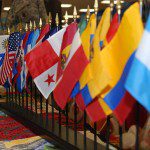![By SidSultan05 (Own work) [CC BY-SA 3.0 (http://creativecommons.org/licenses/by-sa/3.0)], via Wikimedia Commons](https://wp-media.patheos.com/blogs/sites/533/2015/03/Kaaba_Shariff.jpg)
Yeah, I know, not really any of my business whether Muslims believe that their religion obliges them to make a pilgrimage to Mecca, but the reality is that it’s problematic, to say the least.
Consider that the ever-growing numbers of Hajj-attendees lead to stampedes, with the 2015 stampede the worst so far, with a death toll of 2,411, according to AP reporting in Wikipedia. The crowds have grown so large, with 3 million a year, that these stampedes seem near-unavoidable, especially given that the Hajj doesn’t just mean setting foot in Mecca, but following a series of prescribed rituals.
And it’s not just that. The unceasing drive to expand the Grand Mosque, and facilities for pilgrims, paired with the Wahhabi ideology, has resulted in the destruction of countless historic sites (even the birthplace of Muhammad was slated to have been razed in 2014, but perhaps the Saudis didn’t go this far as I can’t find any news on its fate). And the Muslim world is powerless to protest because the Saudis control visa allocations for pilgrims, and use this power to punish any country that might raise its voice. (See this 2015 post for details.)
Last week, it was reported that Iran has banned its citizens from attending the upcoming Hajj, citing safety concerns. This follows reports in January that, after the Saudi execution of a Shi’ite cleric, Iran reportedly banned its citizens from the “lesser” pilgrimage, that is, a pilgrimage to Mecca that occurs at some other time of the year than the official Hajj dates. (Also reported in Slate.) And here’s a Forbes article that describes the economic impact of the pilgrimage, in terms of potential financial loss.
Sure, other religions have their pilgrimages. In Christianity, the Crusades were effectively an attempt to reclaim the Holy Land for Christendom after its conquest by the Islamic Empire, but the more immediate cause was the fact that the local government ceased to permit Christians to travel there on pilgrimage. Indeed, in the middle ages, pilgrimages to any site associated with a saint were popular, and not just limited to the wealthy — you might say they were the means of “going on vacation” back in the day, and the first hostels were accommodation for pilgrims. And the “holy year” that Pope Francis decreed is not the first such year, and prior instances had offered special spiritual benefits for travel to Rome, but this time around, he has wisely encouraged a pilgrimage, as a spiritual journey, to any of a number of designated sites worldwide.
But the notion that it’s a religious requirement to go to Mecca, at a specific time in the year, once in your lifetime? Well, you could see that making sense in seventh-century Arabia, especially since Mecca was already a pilgrimage site (the Kaaba was already considered sacred by the pagans in Arabia at the time, and Muhammad just reinterpreted it), and Meccans were presumably relieved that Muhammad continued that tradition and/or conditioned their support of him on keeping the pilgrimage.
But in 2016? For all that the rise of Iran as a regional hegemon is concerning, I’m rooting for them to bring about a breakthrough in this particular Islamic practice.
Image: The Kaaba. By SidSultan05 (Own work) [CC BY-SA 3.0 (http://creativecommons.org/licenses/by-sa/3.0)], via Wikimedia Commons













